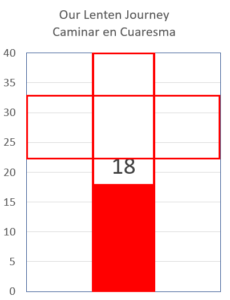

Our Lenten Journey / Caminar en Cuaresma
versión en español
Tuesday – March 14 – Day 18
Forgiving From the Heart
Peter approached Jesus and asked him, “Lord, if my brother sins against me, how often must I forgive him? As many as seven times?” Jesus answered, “I say to you, not seven times but seventy-seven times.” Matthew 18:21–22
Forgiveness of another is difficult. It’s much easier to remain angry. This line quoted above is the introduction to the Parable of the Unforgiving Servant. In that parable, Jesus makes it clear that if we want to receive forgiveness from God, then we must forgive others. If we withhold forgiveness, we can be certain that God will withhold it from us.
Peter may have thought that he was being quite generous in his question to Jesus. Clearly Peter had been considering Jesus’ teachings about forgiveness and was ready to take the next step of offering that forgiveness freely. But Jesus’ answer to Peter makes it clear that Peter’s concept of forgiveness greatly paled in comparison to the forgiveness demanded by our Lord.
The parable that Jesus then tells presents us with a man who was forgiven a huge debt. Subsequently, when that man encountered a person who owed him a small debt, he failed to offer the same forgiveness that was given to him. As a result, the master of that man who was forgiven the huge debt becomes outraged and requires once again a full payment of the debt. And then Jesus ends the parable with a shocking statement. He says, “Then in anger his master handed him over to the torturers until he should pay back the whole debt. So will my heavenly Father do to you, unless each of you forgives your brother from your heart.”
Note that the forgiveness God expects us to offer others is one that comes from the heart. And note that a lack of forgiveness on our part will result in us being handed “over to the torturers.” These are serious words. By “torturers,” we should understand that the sin of not forgiving another brings with it much interior pain. When we hold on to anger, this act “tortures” us in a certain way. Sin always has this effect upon us, and it is for our good. It’s a way in which God constantly challenges us to change. Thus, the only way to freedom from this interior form of torture by our sin is to overcome that sin, and in this case, to overcome the sin of withholding forgiveness.
Reflect, today, upon the calling God has given to you to forgive to the fullest extent. If you still sense anger in your heart toward another, keep working at it. Forgive over and over. Pray for that person. Refrain from judging them or condemning them. Forgive, forgive, forgive, and God’s abundant mercy will also be given to you.
Do I have the capacity in my heart to forgive, forgive and forgive again?
Let us pray:
My forgiving Lord, I thank You for the unfathomable depths of Your mercy. I thank You for Your willingness to forgive me over and over again. Please give me a heart worthy of that forgiveness by helping me to forgive all people to the same extent that You have forgiven me. I forgive all who have sinned against me, dear Lord. Help me to continue to do so from the depths of my heart.
Source: mycatholic.life
USCCB Daily Readings: bible.usccb.org/bible/readings/031423.cfm
Martes – 14 de marzo – Día 18
Perdonar desde el corazón
Pedro se acercó a Jesús y le preguntó: “Señor, si mi hermano peca contra mí, ¿cuántas veces debo perdonarlo? ¿Hasta siete veces? Jesús respondió: “Te digo, no siete veces, sino setenta y siete veces”. Mateo 18:21–22
Perdonar a otro es difícil. Es mucho más fácil permanecer enojado. Esta línea citada arriba es la introducción a la Parábola del Siervo que no perdona. En esa parábola, Jesús deja en claro que si queremos recibir el perdón de Dios, debemos perdonar a los demás. Si retenemos el perdón, podemos estar seguros de que Dios nos lo negará.
Pedro pudo haber pensado que estaba siendo bastante generoso en su pregunta a Jesús. Claramente Pedro había estado considerando las enseñanzas de Jesús sobre el perdón y estaba listo para dar el próximo paso de ofrecer ese perdón libremente. Pero la respuesta de Jesús a Pedro deja en claro que el concepto de perdón de Pedro palideció mucho en comparación con el perdón exigido por nuestro Señor.
La parábola que luego cuenta Jesús nos presenta a un hombre al que se le perdonó una enorme deuda. Posteriormente, cuando ese hombre se encontró con una persona que le debía una pequeña deuda, no le ofreció el mismo perdón que le fue dado a él. Como resultado, el amo de ese hombre a quien se le perdonó la enorme deuda se indigna y exige una vez más el pago total de la deuda. Y luego Jesús termina la parábola con una declaración impactante. Él dice: “Entonces, enojado, su amo lo entregó a los torturadores hasta que pagara toda la deuda. Así hará con vosotros mi Padre celestial, si cada uno de vosotros no perdonare de corazón a vuestro hermano.”
Tenga en cuenta que el perdón que Dios espera que ofrezcamos a los demás es el que viene del corazón. Y tenga en cuenta que la falta de perdón de nuestra parte resultará en que seamos entregados “a los torturadores”. Estas son palabras serias. Por “torturadores” debemos entender que el pecado de no perdonar a otro trae consigo mucho dolor interior. Cuando nos aferramos a la ira, este acto nos “tortura” de cierta manera. El pecado siempre tiene este efecto sobre nosotros, y es para nuestro bien. Es una forma en la que Dios nos desafía constantemente a cambiar. Por lo tanto, la única forma de liberarnos de esta forma interior de tortura por nuestro pecado es vencer ese pecado y, en este caso, vencer el pecado de retener el perdón.
Reflexiona hoy sobre el llamado que Dios te ha dado a perdonar en toda su extensión. Si todavía siente enojo en su corazón hacia otro, siga trabajando en eso. Perdona una y otra vez. Oren por esa persona. Abstenerse de juzgarlos o condenarlos. Perdonad, perdonad, perdonad, y la abundante misericordia de Dios también os será dada.
¿Tengo la capacidad en mi corazón para perdonar, perdonar y volver a perdonar?
Oremos:
Mi Señor perdonador, te agradezco por las insondables profundidades de tu misericordia. Te agradezco por Tu voluntad de perdonarme una y otra vez. Por favor, dame un corazón digno de ese perdón ayudándome a perdonar a todas las personas en la misma medida en que Tú me has perdonado a mí. Perdono a todos los que han pecado contra mí, amado Señor. Ayúdame a seguir haciéndolo desde lo más profundo de mi corazón.
Lecturas de Hoy: bible.usccb.org/es/bible/lecturas/031423.cfm